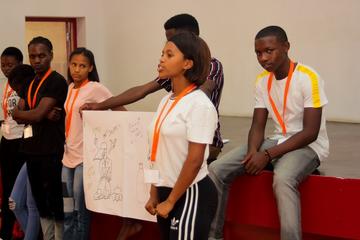Though stories are universal and universally of benefit, access to story-telling is not. I am currently involved in a research project that’s trying to address this. The United Kingdom Research and Innovation fund’s Accelerate Hub is working with adolescent groups in Africa with the aim of helping African teenagers achieve their goals and aspirations. Narrative is often an excellent medium for doing so. As has recently been demonstrated under the COVID-19 lockdown, storytelling and related creative activities can provide powerful forms of relief and release in situations of isolation and deprivation.

The Accelerate Hub is led by an interdisciplinary team at Oxford University and the University of Cape Town, with University partners across Africa from South Sudan and the Democratic Republic of Congo to Lesotho and Tanzania. We actively host adolescent engagement activities in multiple African countries, which have included Sierra Leone, Uganda, Kenya and South Africa to date. These groups have been composed of diverse groups of young people, including young parents, adolescents living with or closely affected by HIV, and adolescents living in contexts of poverty and precarity. Aware that adolescents are experts in their own lives and contexts, Accelerate Hub has been hard-at-work with teen advisory groups to learn about the issues that are important to them.
Some of these engagement events have been storytelling workshops, the most recent of which, Narrative and Adolescence, was held in Cape Town in March 2020. The workshops have looked at how adolescents across the African continent use storytelling, performance and a range of narrative forms and patterns to understand their worlds. We observed throughout how sharing personal stories helped the young people to manage stress and share anxiety.
The aim was to discover not only how can adolescents exercise agency through story-telling and other kinds of creative practice; but also how institutions, structures and social interventions can help to support their stories in empowering ways.
Asking these questions about storytelling and adolescence required approaches that bridged disciplines. It brought in perspectives from psychiatry to literary studies, public health to postcolonial geography, and economics to medical humanities and philosophy. It also meant listening attentively to the experiences and work of storytellers, performers, and especially adolescent storytellers themselves.
The workshops highlighted that the African teenagers we worked with are not seeing enough of themselves in the stories they access; there is a lack of representation in global popular culture. Although creativity is clearly not correlated to wealth, there remains an inequality in access to certain (often positive) stories, meaning that where you come from affects the narratives you have available to feed your imagination. The teenagers in the workshop saw positive stories as coming from elsewhere. Breakthrough stories in many cases involved an escape from their communities to affluent places abroad.
Experiential psychology provides ample evidence that “how we see the world” is as important as “how the world is”. So, the activity of storytelling can itself make an impact on how we see the world. It is in itself a postcolonial activity. If individuals are empowered by hearing stories that speak to their own conditions, then there is an excellent case for policy-makers and researchers on Africa to intervene to make more stories and more storytelling facilities available to more young African people.
Professor Elleke Boehmer